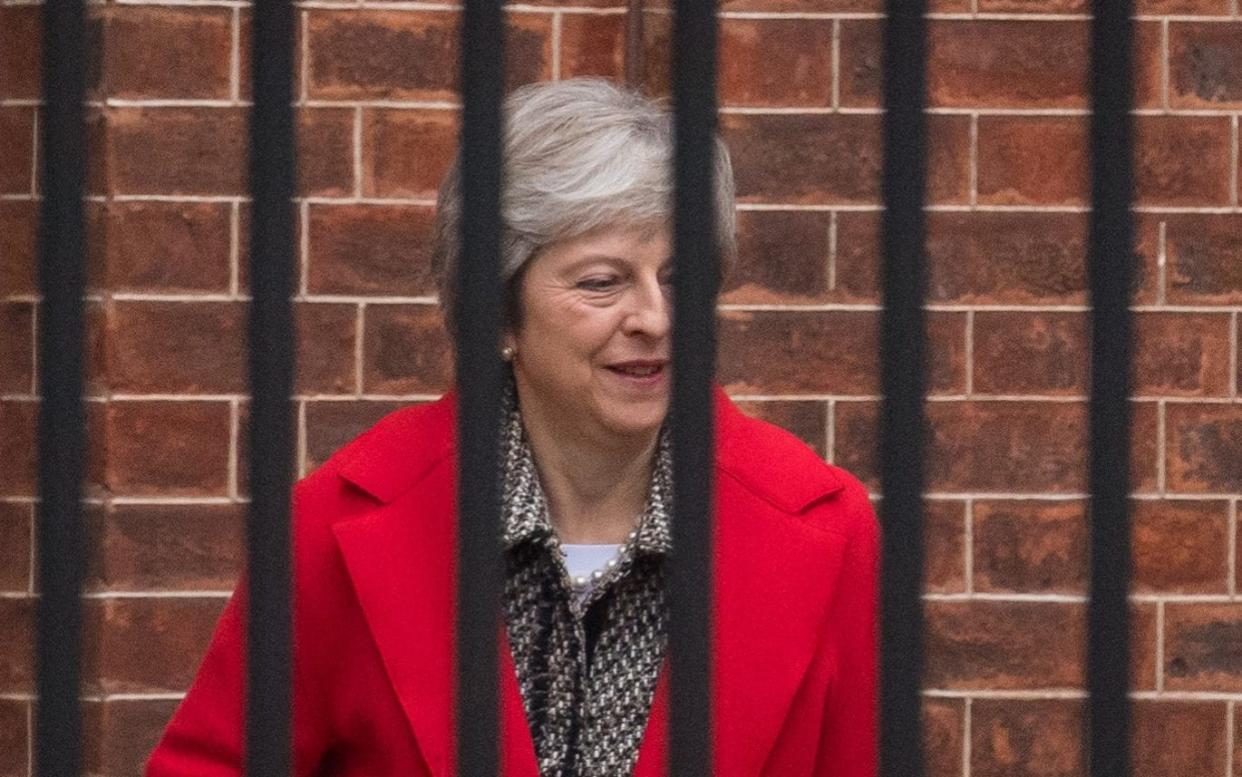Letters: Theresa May has been persuaded that believers in Brexit need saving from themselves

SIR – Since details of the draft Withdrawal Agreement have emerged, I have been trying to rationalise how our Prime Minister could have thought it both proper and acceptable to ignore her own commitments to the British people, as set out in her Mansion House and Lancaster House speeches, and to negotiate a deal that is much worse than remaining in the EU. This is a deal that, extraordinarily, infuriates both Remainers and Brexiteers.
My conclusion is that Treasury officials and other senior civil servants, together with the Chancellor Philip Hammond and some hand-picked Remainer business leaders, have managed to convince Theresa May that Brexiteers need saving from themselves. They believe complete subservience to the EU in perpetuity is better than the alternative of Britain’s economy crashing and burning outside the EU customs union.
Either she has bought this nonsense, or she has gone quite mad. Surely it is the collective duty of Parliament to stop her before it is too late.
Bill Simpson
Canterbury, Kent
SIR – A good deal can be one in which both parties believe they have got a good outcome, or one in which neither thinks so. It can never be one in which one side believes that it has lost and the other that it has won. The latter is the case with the Brexit “agreement”.
Tom Williams
Sheffield, South Yorkshire
SIR – There is no such thing as “no deal” between the UK and the soon-to-be rump EU.
In the absence of a bi-lateral UK-EU trade agreement after Brexit, two-way trade between the UK and the Continent will continue, perfectly legally, on World Trade Organisation (WTO) terms.
At Bretton Woods in 1944, the UK (whose delegation included John Maynard Keynes) was one of 23 founder-countries of the General Agreement on Tariffs and Trade, which morphed into the WTO in 1995. The WTO currently has more than 160 member-countries. Today, 74 years after Bretton Woods, global customs duties (which are levied only on cross-border trade in goods: trade in services is tariff-free) average a little over one per cent of the underlying value of the goods traded.
HM Revenue & Customs, one of the most efficient customs bodies in the world, assesses the bulk of duties electronically, that is to say remotely: not at Dover, Felixstowe or other ports. Other developed countries’ customs bodies also assess duties remotely.
The US has no deal (free trade agreement) with the EU. China has no deal (free trade agreement) with the EU. Yet, though neither country is a member of the EU, both export more goods to continental EU than the UK.
Immediately after Brexit, it is probable that the UK will trade with the EU on the basis of “no deal”, without a specific UK-EU trade agreement. If, post-Brexit, the UK and the EU conclude that a specific bilateral free trade agreement is in their interests, they can set one up.
Ian Milne
Lewes, East Sussex
SIR – In his email to Conservative Party members this week, the party chairman Brandon Lewis trotted out the stock phrase that the Prime Minister’s deal will “take control of our money, laws and borders”. Yet the draft text shows the UK will be bound to the customs union in all but name. If we were to agree, we would also put our own Union at risk. We were warned the EU would not offer a good deal, and so it has proved. It’s time all Conservative MPs face up to the prospect of a no-deal exit, and work to deliver it.
Simon Morris
Towcester, Northamptonshire
SIR – The smiles on the faces of Michel Barnier and Donald Tusk tell me who won and who lost.
Mike Leonard
Northampton
Asylum for Asia Bibi

SIR – I was shocked to learn that Asia Bibi, a Christian woman recently acquitted of blasphemy who is living in fear of her life in Pakistan, is probably not being allowed sanctuary in this country (report, November 11).
Britain’s laws and customs are derived from its Christian heritage, and we pride ourselves on being open minded and welcoming to refugees fleeing from political and religious persecution. We gave the women’s rights campaigner Malala Yousafzai asylum; can we not offer the same to Mrs Bibi and her family?
Yvonne Scawen
Taunton, Somerset
SIR – The Salisbury poisonings have shown that we live in dangerous times. As such, I don’t think Britain should become the world’s asylum capital.
John Marchant
Banbury, Oxfordshire
Next time, ask Jeeves

SIR – P G Wodehouse did of course create the “frightful ass” Roderick Spode – but he did not, as Patricia Evans implies (Letters, November 11) quote him as believing it the right of every worker to have a British bicycle, a British umbrella and Brussels sprouts.
This pronouncement, or something like it, was invented for the television series Jeeves and Wooster.
Far more serious is the letter’s reference to “Sir Roderick Spode”. He was just plain Roderick Spode until the death of an uncle brought him the title of Lord Sidcup.
Murray Hedgcock
Patron, The P G Wodehouse Society (UK)
London SW14
A revised Highway Code for happier cycling
SIR – What is it about cyclists that creates such anger, on both sides? Clearly safety must be an essential ingredient of both driving and cycling, but there is an immense disparity between the responsibilities imposed on each.
Motorists have to be readily identifiable and have a code of conduct for driving on the highways that has taken years to evolve. Cyclists do not.
Steps need to be taken to ensure that cyclists do not abuse their position. May I suggest:
Cyclists on the highway should have a rear-view mirror.
Cyclists must queue behind cars when waiting at crossings.
Cyclists must carry a clearly visible registration number somewhere on their person or bicycle.
Cyclists should not be allowed to ride two abreast on any B-road.
Cyclists should not be allowed to pass along the nearside of cars when they are waiting at traffic lights or road junctions.
There are many safe and considerate cyclists as there are many safe and considerate motorists, but until a more even balance is struck, anger and accidents are inevitable.
Anthony Brookes
Charlwood, Surrey
SIR – In its rules for cyclists, the current Highway Code, states in Rule 67: “Look well ahead for obstructions in the road, such as drains, potholes and parked vehicles.” It does not recommend that the middle of the lane should be used.
Bill Hopton
Kirkcaldy, Fife
No B12 in broccoli

SIR – In an interview by Edward Malnick with the Health Secretary, Matt Hancock (November 4), Mr Hancock states that “a vitamin B12 deficiency leads to a higher instance of dementia but can be prevented by eating broccoli”.
There is no vitamin B12 in broccoli. Indeed, the only non-animal food that contains B12 is seaweed. Broccoli is rich in folate (vitamin B9), which can address any folate deficiency. However, if anyone has a B12 deficiency as well as a folate deficiency, then it is imperative that both deficiencies are addressed. Failure to do so will lead to all manner of problems in the future.
Martyn Hooper
Chairman, Pernicious Anaemia Society
Bridgend, Glamorgan
Another Italian switch
SIR – Further to the mystery of the Italian upside-down switches (Letters, November 4), I also have to ask: why do all Italian windows open inwards, making placing ornaments on windowsills impossible?
Christine Lamagni
Swanage, Dorset
Hefty christening cake and birthday dishes

SIR – I recently found an old Daily Telegraph recipe book that belonged to my mother. It includes a recipe for Prince Charles’s Christening Cake, which would produce a fruit cake weighing 24lb. However, some of the recipes sound dire: Scrambled Hake; Indian Curried Rabbit; or Striped Chestnut Mould – perhaps not on your birthday.
Sylvia Genner
Telford, Shropshire
Make workplace mental health aid mandatory
SIR - We as the Chairman of Mental Health First Aid England and CEO of Bauer Media Group, along with leaders of some of the UK's biggest employers, write to ask that the Government prioritises its manifesto pledge to amend the Health and Safety regulations, so that workplaces are required to make provision for mental as well as physical first aid.
The commitment to make mental health first aid mandatory is supported by both employers and the public; since May 2018, more than 200,000 people have signed the Bauer Media change.org petition.
There are both economic and human reasons for this. Each year, mental health issues cost the UK economy almost £35 billion, with 15.4 million working days lost to work-related stress, depression or anxiety. But the cost is not just financial: mental ill health has an impact on all relationships and on quality of life.
As employers, we have a duty of care for our staff. While some are equalising their number of mental health first aiders with physical first aiders, others are not. Cost is no excuse because, in the long term, making mental health first aid mandatory will save money.
Success will ensure that employees everywhere can access a trained staff member to receive support and guidance. Success will ensure every employee has the right to a mentally healthy environment. It will also mean that we can finally break the stigma of mental health in the workplace.
We all have mental health needs just as we have physical health needs. The law must change to reflect this.
Professor Mark Watson-Gandy
Chairman, Mental Health First Aid England
Paul Keenan
CEO, Bauer Media Group
Andy Barratt, Ford of Britain, Chair and Managing Director
Kevin Ellis, Chairman and Senior Partner, PwC
Peter Harrison, Group Chief Executive, Shroders
Stephen Clarke, CEO WHSmith
Alastair Campbell, Ambassador, Time to Change
David Hughes, Chief Executive, Association of Colleges
Andrew Goodacre, CEO, British Independent Retailers Association
John Kirkland, Chairman, Bowmer & Kirkland
Martin Coyd OBE, Director, Building Mental Health
David Hynam, UK CEO Bupa,
Amanda Mackenzie OBE, CEO, Business in the Community
Sarah Hughes, CEO, Centre for Mental Health
Chris Blythe, Chief Executive, The Chartered Institute of Building
Poppy Jaman OBE, CEO, City Mental Health Alliance
Miles Celic, CEO, The City UK
Jonathan Allan, Chief Commercial Officer, Channel 4
Ann Francke, CEO, Chartered Management Institute
Roy Rickhuss, General Secretary, Community Union
Graham Watts, Chief Executive, Construction Industry Council
Simon Linares, HR Director, Direct Line Group
Jason Cotterrell, Managing Director, Exterion Media
Gordon McKenzie, Chief Executive, Guild HE
Susan Bright, Managing Partner, Hogan Lovells
Kelly Hoppen MBE, Business Owner, Author, Designer
Elizabeth Rimmer, CEO, LawCare,
Lord Sugar
Mark Reynolds, CEO, Mace
Josh Krichefski, CEO, MediaCom UK
Evri Anagnostara, Chair, Mental Health Nurses Association
Chris Keates, General Secretary, NASUWT - The Teachers’ Union
Sam Orrin, Senior Partnerships Manager, NABS
Natasha Devon MBE
Ole Vahlgren, President and CEO, Otsuka
Francis Ingham, Director General, PRCA
Professor Lord Patel of Bradford OBE
Sue Frogley, CEO, Publicis Media
Carolyn Pepper, Partner, Reed Smith
Richard Boland, CEO, retailTRUST
Mark Winstanley, CEO, Rethink Mental Illness
Dr Shaun Davis, Global Director of Safety, Health, Wellbeing &
Sustainability, Royal Mail,
Marjorie Wallace CBE, CEO, SANE
Tracy Clarke, CEO, Europe & Americas, Standard Chartered
Jodie Stranger, CEO UK Group & President Global Clients EMEA, Starcom
Martin Houghton-Brown, Chief Executive, St John Ambulance
Rosie Tressler, CEO, Student Minds
Jenny Biggam, Co-founder, 7 Stars
Karl Simons, Chief Health, Safety & Security Officer, Thames Water
David Dyson, Chief Executive, Three UK
Len McCluskey, General Secretary, Unite the Union
Alistair Jarvis, CEO, Universities UK
Marie Kan, Head of Service Counselling, Health Advice
and Chaplaincy, University of the Arts London
Chris Stirk, Senior VP and General Manager, Weight Watchers
Paul Hutchinson, CEO, Wavemaker UK
Emma Thomas, Chief Executive, Young Minds

 Yahoo News
Yahoo News 
